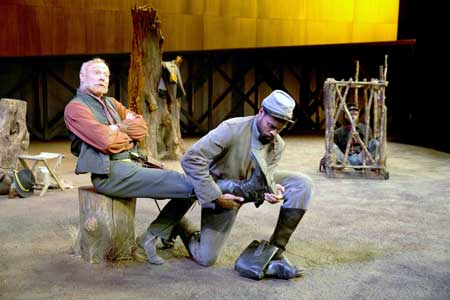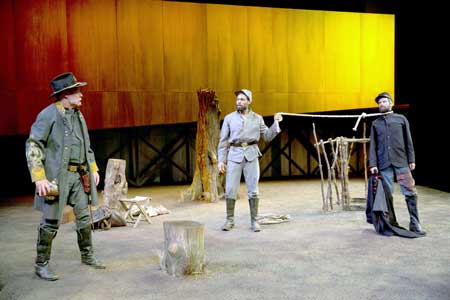Play (2014)
by Suzan Lori-Parks
Directed by Jo Bonney
American Repertory Theater
Cambridge, MA
January 23 – March 1, 2015
With Benton Greene (Hero), Ken Marks (Colonel), Michael Crane (Captive Union Soldier), Sekou Laidlow (Homer), Jenny Jules ((Penny), Harold Surratt (Oldest Old Man), Jacob Ming-Trent (Odyssey Dog), Charlie Hudson III (Slave), Julian Rozzell Jr. (Slave), Tonye Patano (Slave)

Benton Greene as Hero
in Part 2: “A Battle in the Wilderness”
of “Father Comes Home From The Wars, Parts 1,2,3”
Photo: Evgenia Eliseeva
Courtesy of American Repertory Theater
Hero (Benton Greene) is a slave on a Southern plantation, and, during the Civil War, is given an option by his master to fight for the Confederacy and be granted freedom in exchange afterwards. The first part of the play focuses on a group of fellow slaves betting whether Hero will actually take the master up on his offer. The second part shows Hero and his master with a captured Union soldier. The third part shows a group of slaves, some of whom are ones from the original plantation and some who are newly escaped, encountering Hero just after the war.
Suzan Lori-Parks is a writer of considerable talent whose Pulitzer Prize winning effort, Topdog/Underdog (2002) is a masterpiece. Depicting the relationship between two African-American brothers, one of whom works as an Abraham Lincoln impersonator, she weaves a dramatic and heart-rending sequence of complications which in the end leave one breathless. Tautly written, with rich interweavings of the musical patter of street-gaming sharks, it is entertaining, riveting and deeply moving.
The second part of Father Comes Home From the Wars is also a masterpiece. With three actors, Benton Greene as Hero, Ken Marks as the Master-Colonel, and Michael Crane as the captured Union soldier, Parks creates a tense, complex and vivid drama. The subtleties of changing fidelities are played out with enormous satisfaction. One watches with wonder the almost musical fluctuation of brutality and devotion between master and slave and the alteration of tonalities when the identity of the Union soldier comes into relief. In this second part, Parks has created a single act drama of great significance. Ken Marks as the Master-Colonel is particularly effective and together the three actors form a beautiful ensemble.

Benton Greene as Hero
Michael Crane as Captive Union Soldier
in Part 2: “A Battle in the Wilderness”
of “Father Comes Home From The Wars, Parts 1,2,3”
Photo: Evgenia Eliseeva
Courtesy of American Repertory Theater
The first part of the play involving a group of fellow slaves betting about whether Hero will take the Master up on his offer is not as realized, but offers an interesting setup of the premise. As with Topdog/Underdog, the originating idea of Father Comes Home, an African-American going to fight for the Confederacy in order to gain his freedom, is replete with dramatic ramifications. Part 1 frames the setup with an attenuation that gives the drama an expansiveness that provides reasonable anticipation for the masterfully written Part 2. Though not as strong as Part 2, Part 1 leads into it with a consistent tone that enables one to fully appreciate Part 2 when it arrives.
That said, I found Part 3 considerably wanting. Written with a general inconsistency of tone, and involving the portrayal of a comedic dog who reports about Hero’s whereabouts – taken, as is some of the rest of the narrative from the overworked Odyssey theme that flows throughout – this part deflates the considerable drama created in Part 2. The introduction of a love triangle, again derived from the Odyssey, seems like an inadequately realized attempt to concoct a personal drama. Going with the simple but already dramatic story, as is the case in the masterful Part 2, would have been so much more appropriate. The result in Part 3 is a narrative jumble that comes across as overwrought, inappropriately comedic and melodramatic in turns, and strikingly inconsistent in tone with the magisterial drama that precedes it, jarringly weird and unsatisfying.

in Part 2: “A Battle in the Wilderness”
of “Father Comes Home From The Wars, Parts 1,2,3”
Photo: Evgenia Eliseeva
Courtesy of American Repertory Theater
Music during the intervals is provided by Steven Bargonetti who plays a robust and bluesy country guitar with music and words written, admirably and notably, by the playwright.
Parks’ implicit talent and demonstrated mastery are vitally evident in the Part 2 of this play, which, again, could very easily stand on its own. It demonstrates the same kind of brilliance that Topdog/Underdog shows by unfolding a tragic drama out of a complex initiating situation without the addition of unnecessary and intrusive narrative.
– BADMan
I adored Topdog/Underdog, but was wary in exactly the ways you explain. Glad for this clear review with good perspective on a great playwright.